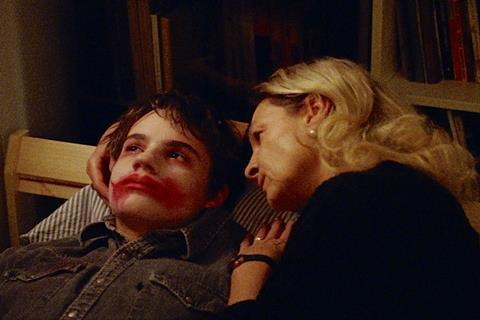A teenager in 1990s Serbia discovers who his beloved mother really is in Vladimir Perisic’s political drama

Dir: Vladimir Perisic. Serbia, France, Luxemburg, Croatia. 2023. 98mins
Serbia, 1996. Fifteen-year-old Stefan (Jovan Ginic) finds himself torn between his loyalty to his beloved mother, Marklena (Jasna Duricic) and his friendships with politically-engaged fellow students. As the spokeswoman for the Milosevic regime, Marklena is frequently on television and viewed by these student protestors as a mouthpiece for a corrupt government. Stefan believes his mother when she tells him that the elections were not stolen, that the rumours of police brutality are false. But he finds himself increasingly ostracised for his stance. This impressive, nuanced picture works as a coming-of-age story, an examination of Balkan generational guilt and a mercurial portrait of a career politician. It is a personal work for Vladimir Perisic – his mother worked for Milosevic, although not in a high-profile role.
There is an urgency and restlessness in the film that finds an echo in the political protest of a modern generation
Lost Country is Perisic’s somewhat belated second feature: his first film, Ordinary People, premiered in Critics Week in 2009, and went on to win prizes at several festival. Perisic steps back behind the camera following an interlude in which he launched a publishing house, and founded and ran the Belgrade Auteur Film Festival. On the strength of this compelling, handsomely mounted picture, which was co-written by Alice Winocour (Proxima), it’s a welcome return to filmmaking. Despite being set nearly 30 years ago, there is an urgency and restlessness in the film that finds an echo in the dissent and political protest of a modern generation.
The film opens with a seemingly idyllic moment at the country home of Stefan’s grandparents. Stefan and his grandfather are gathering walnuts. The grandfather, a staunch old socialist, reminisces about his past sporting glory – he competed in the Seoul Olympics for the Yugoslavian water polo team; the dog, a cheerful golden Labrador, runs giddy circles around them. Stefan barely notices the storm (both literal and metaphorical) brewing in the distance, because he’s thrilled that Marklena will be joining them for supper. With his father out of the picture, there is an unusually strong bond between the boy and his mother. Stefan doesn’t know it yet, but this may be the last moment of pure, uncomplicated childhood happiness that he will enjoy.
Marklena (whose unusual name was chosen by her father, a contraction of Marx and Lenin) is even busier than usual, preparing for the forthcoming elections. Stefan is left to his own devices.The apartment they share is comfortable – big airy windows, a generous vase of roses on the table. And he has his friends, teammates on the water polo squad, and his studies to keep him busy. But as the results of the election start filtering through, along with rumours of foul play on the part of the Milosevic regime, Stefan starts to feel increasingly isolated. A non-professional actor, Ginic is terrific in the role, with a lovely repertoire of bruised adolescent pouts that he puts to effective use throughout the film.
The film is loaded – at times, overly so – with symbolic images and scenes. Stefan, who is blind to his mother’s crimes, has a moment of realisation at an appointment with an optician. The roses on the dining table wilt and drop as, in government, the rot sets in. And the framing emphasises division, placing Stefan in visual boxes that separate him from both friends and family. Particularly striking is a shot towards the end of the film. Stefan flees from his grandfather’s birthday celebration, his tiny figure visible through the window. And Marklena scowls after him, her face looming huge in the reflection. The all-seeing eyes of the government are everywhere.
Production company: KinoElektron, Easy Riders Films, Trilema
International sales: Memento International sales@memento-films.com
Producers: Janja Kralj, Nadia Turincev, Omar El Kadi, Vladimir Perisic
Screenplay: Vladimir Perisic, Alice Winocour
Cinematography: Sarah Blum, Louise Botkay Courcier
Editing: Martial Salomon, Jelena Maksimovic
Production design: Daniela Dimitrovska
Music: Alen Sinkauz, Nenad Sinkauz
Main cast: Jovan Ginic, Jasna Duricic, Miodrag Jovanovic, Lazar Kocic, Dusko Valentic, Ana Simeunovic, Boris Isakovic, Pavle Cemerikic, Marija Skaricic, Helena Buljan























